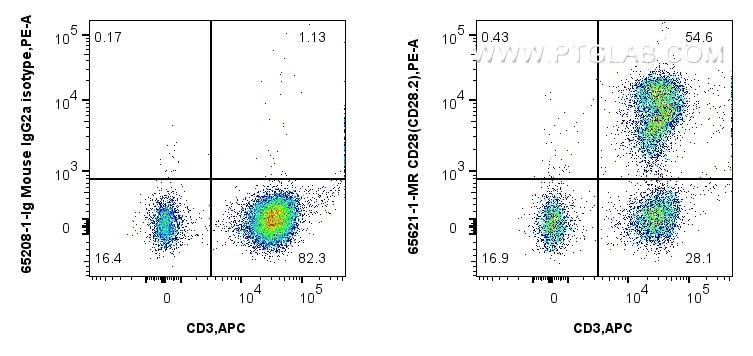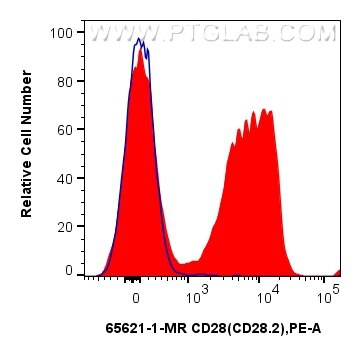Tested Applications
| Positive FC detected in | human PBMCs |
Recommended dilution
| Application | Dilution |
|---|---|
| This reagent has been tested for flow cytometric analysis. It is recommended that this reagent should be titrated in each testing system to obtain optimal results. | |
| Sample-dependent, Check data in validation data gallery. | |
Product Information
65621-1-MR targets CD28 in FC applications and shows reactivity with human samples.
| Tested Reactivity | human |
| Host / Isotype | Mouse / IgG2a |
| Class | Recombinant |
| Type | Antibody |
| Immunogen | N/A Predict reactive species |
| Full Name | CD28 molecule |
| Calculated Molecular Weight | 220 aa, 25 kDa |
| GenBank Accession Number | BC093698 |
| Gene Symbol | CD28 |
| Gene ID (NCBI) | 940 |
| ENSEMBL Gene ID | ENSG00000178562 |
| RRID | AB_3670364 |
| Conjugate | Unconjugated |
| Form | Liquid |
| Purification Method | Protein A purification |
| Storage Buffer | PBS with 0.09% sodium azide , pH 7.3 |
| Storage Conditions | Store at 2-8°C. Stable for one year after shipment. |
Background Information
CD28 (T-cell-specific surface glycoprotein CD28), also known as T44 and Tp44, is a 44 kD disulfide-linked homodimeric type I glycoprotein (PMID: 2162180). It is a member of the immunoglobulin superfamily and is expressed on most T lineage cells, NK cell subsets, and plasma cells (PMID: 2162180, 8386518). CD28 may affect in vivo immune responses by functioning both as a cell adhesion molecule linking B and T lymphocytes and as the surface component of a novel signal transduction pathway (PMID: 2162180, 3021470). CD28 binds both CD80 and CD86 with a highly conserved motif MYPPY in the CDR3-like loop (PMID: 15696168, 7964482). CD28 is considered a major co-stimulatory molecule, inducing T lymphocyte activation and IL-2 synthesis, and preventing cell death (PMID: 1348520).
Protocols
| Product Specific Protocols | |
|---|---|
| FC protocol for CD28 antibody 65621-1-MR | Download protocol |
| Standard Protocols | |
|---|---|
| Click here to view our Standard Protocols |





